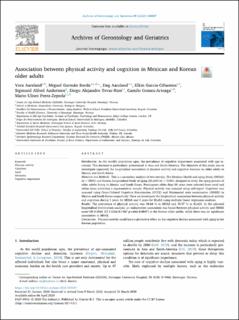Association between physical activity and cognition in Mexican and Korean older adults
Peer reviewed, Journal article
Published version

Permanent lenke
https://hdl.handle.net/11250/2651816Utgivelsesdato
2020-04Metadata
Vis full innførselSamlinger
Originalversjon
Aarsland, V., Borda, M. G., Aarsland, D., Garcia-Cifuentes, E., Anderssen, S. A., Tovar-Rios, D. A., ... & Perez-Zepeda, M. U. (2020). Association between physical activity and cognition in Mexican and Korean older adults. Archives of gerontology and geriatrics, 89, 104047. 10.1016/j.archger.2020.104047Sammendrag
Introduction: As the world's population ages, the prevalence of cognitive impairment associated with age in- creases. This increase is particularly pronounced in Asia and South-America. The objective of this study was to investigate separately the longitudinal association of physical activity and cognitive function in; older adults in Mexico and South Korea. Materials and Methods: This is a secondary analysis of two surveys, The Mexican Health and aging Study (MHAS) (n = 5853) and Korean Longitudinal Study of aging (KLoSA) (n = 5188), designed to study the aging process of older adults living in Mexico and South Korea. Participants older than 50 years were selected from rural and urban areas achieving a representative sample. Physical activity was assessed using self-report. Cognition was assessed using Cross-Cultural Cognitive Examination (CCCE) and Minimental state examination (MMSE) in Mexico and South Korea respectively. Here we investigate the longitudinal association between physical activity and cognition during 3 years for MHAS and 4 years for KLoSA using multiple linear regression analyses. Results: The prevalence of physical activity was 40.68 % in MHAS and 35.57 % in KLoSA. In the adjusted longitudinal multivariate analysis, an independent association was found between physical activity and MMSE score OR 0.0866 (CI 0.0266-0.1467 p-value 0.0047) in the Korean older adults, while there was no significant association in MHAS. Conclusions: Physical activity could have a protective effect on the cognitive decline associated with aging in the Korean population.
